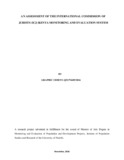| dc.description.abstract | In the recent past there has been commitment by development agencies to focus on results, impact and mutual accountability to provide evidence towards aid effectiveness. In light of this, the study was conducted to assess the International Commission of Jurists (ICJ) Kenya chapter’s M&E system; an NGO founded in 1959 with the aims of serving its beneficiaries through improving protection of the rights of humans, access to justice elevation, empowerment of citizens and justice systems and institutional improvements across Africa. ICJ has four Programs in Kenya, namely; Justice access assurance, Democratization, Protection of Human Rights and International Cooperation. The study was to determine if the International Commission of Jurists (ICJ) M&E system meets the conventional M&E system standards using qualitative research approach.
Purposive sampling was used to select Key informants for the assessment, attaining a sample size that included 13 employees; Executive Officer, M&E manager, four program managers, four program officers and three research officers from ICJ. With a score of 48 out of 80 ICJ attained 60 percent. Scores varied within components with data use and advocacy and communication scoring the highest at 88 and 86 percent respectively, whereas National and subnational data bases and M&E work Plan scored the lowest at 17 percent and 33 percent in that order.
Based on above findings, ICJ needs to increase the number of its M&E personnel to meet the prescribed threshold as it develops its organizational structure with M&E posts, job descriptions, and terms of references for reporting units. ICJ should adequately maintain its databases for M&E purposes by developing and conceptualizing electronic data collection, through availing a data quality control mechanism that ensures data is accurately captured.
ICJ should make an effort to involve programme beneficiaries more in evaluations so as to build their capacity. In light of this the evaluations should also focus on involving the beneficiaries in analysis, reporting and data use. In addition, ICJ needs to provide standard management process for its data as a way of routine management system and ensure quality in every step of its data use and M&E. ICJ M&E system should therefore see to it that stakeholder information requirements are evaluated beforehand and the information dispersed to apprise decisions being made. | en_US |



